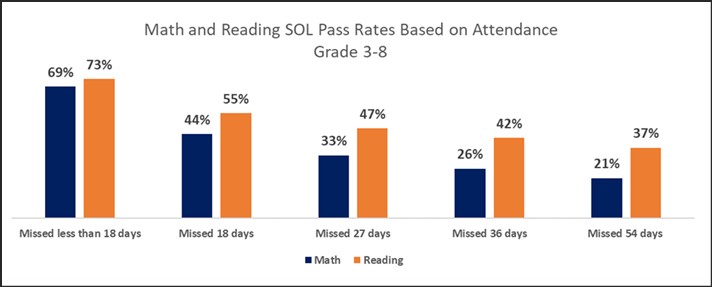
by James A. Bacon
In releasing the 2023 Standards of Learning (SOL) scores, which showed marginal overall improvement from the disastrous 2022 results, Team Youngkin added a bit of useful analysis — it drew a connection between poor educational performance and school absenteeism.
The Virginia Department of Education press release noted that students in 3rd through 8th grades who missed more than 18 days of school scored 18% lower in reading exams than students with regular attendance. Students who missed more than 36 days scored 43% lower. Similar discrepancies occurred in the math exams.
This should come as a surprise to no one. Students can’t learn if they’re not in school (or home school, which these children are not).
To raise SOL scores, the Youngkin administration is targeting the school skippers. #AttendanceMattersVA, according to DOE, “works with Virginia schools and parents to increase attendance by communicating the importance of attendance to families, expanding breakfast after the bell programs, ensuring that every child has a trusted adult at school, monitoring and celebrating successes, and reducing barriers to attendance such as transportation and mental health challenges.”
Clearly, something must be done. These ideas seem as reasonable as any other. But I fear that the problem may be so deeply rooted in social dysfunction that the initiative will prove ineffective.
Let’s start with the opening priority in the VDOE statement: that “communicating the importance of attendance to families” is something that the state needs to do.
Think about that. The underlying premise is that some parents are insufficiently aware that their children benefit from attending school but might be induced by reason to do better.
How can any American alive today fail to understand the crucial importance of education? We’re not talking about 16-year-olds who drop out of school to take a job and help support the family. We’re talking about kids who are eight to 14 years old! It became universally accepted in America more than a century ago that every child needs to be literate and numerate in order to function in industrial-era society. Education is even more imperative now in the knowledge-era society. This is so basic, so fundamental; how can anyone fail to grasp it?
There is something profoundly broken about a society in which the state needs to explain to parents that they need to send their children to school.
Perhaps the problem is not the parents’ ignorance. Perhaps some parents are so incapacitated by their circumstances — homelessness, drug addiction, lethargy, sloth, whatever — that they cannot bestir themselves to exercise the discipline their children require. If that’s the case, then reason is not likely to persuade them.
The #AttendanceMattersVA initiative also mentions reducing “barriers” to school attendance… such as transportation. By transportation, VDOE presumably is referring to school buses. Assuredly, there is a shortage of school bus drivers, just as there is of teachers. Is VDOE suggesting that children are physically unable to get to school? If so, that’s a scandal, but it’s a readily fixable one. Increase pay, hire more drivers, run more buses! But I am skeptical that this is a root problem. The bus-driver shortage has been chronic for years. Skipping school has surged since the COVID lockdowns.
The press release also mentions “mental health challenges.” This also requires explanation. What kind of mental health challenges? Depression? Anxiety? Childhood abuse and trauma? It would be helpful to know. If mental health is a significant contributor to the absenteeism problem, it is not easily addressed. The proliferation of mental illness in society at large is ill-understood and remedies so far have proven unequal to the challenge.
Going down the list of priorities, I have no idea what VDOE hopes to accomplish by expanding “breakfast-after-the-bell programs.” Perhaps the goal is to remove children from toxic home environments as early in the day as possible and keep them in non-toxic school environments as long as possible. That’s consistent with the notion, also expressed, of ensuring that every child has a “trusted adult” at school, which implies that many children do not have trusted adults at home. If this is the case, then say so!
I strongly suspect that absenteeism is a complex social and psychological phenomenon that cannot be solved through administrative action. What’s frustrating is the habit of VDOE officials of cloaking their words in euphemisms encumbered by evasions and bound up by circumlocutions. We need more clarity, which requires more candor.

Leave a Reply
You must be logged in to post a comment.